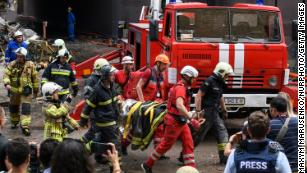Russia appoints new commanders
The Russian hierarchy has also been reorganized, with new commanders for the southern and central forces committed to Ukraine under the overall leadership of Deputy Defense Minister Gennady Zhidko.
The Institute for the Study of War said the “Russian high command is reshuffling and restructuring military command in order to better organize operations in Ukraine.”
It’s perhaps no accident that the first reported visit of Russian Defense Minister Sergei Shoigu and senior commanders to forces involved in the “special military operation” came as the tide seemed to flow in Russia’s favor. Victory has a thousand fathers, but defeat is an orphan.
Rob Lee, an analyst of the Russian military at King’s College London, noted that Zhidko sat next to Shoigu at meetings during his visit. Lee recalled that Russia apparently “had no overall commander in the initial phase (in March), violating the unity of command principle.”
The great unknown is whether Russian success in rolling up Ukrainian defenses in Donetsk might encourage a further expansion of its war aims beyond the special military operation — perhaps an effort to sustain the momentum as far as the Dnipro river, which essentially divides Ukraine into two.
That is the worst-case scenario for the Ukrainians and for now it
aldo shoes remains a distant possibility rather than an imminent risk. Ukrainian forces are still defending some 12,000 square kilometers (4,600 square miles) of Donetsk alone (an area the size of Connecticut.)
Despite Ukrainian reverses in recent weeks, there is still plenty of evidence that Russian armor is also suffering a high rate of attrition. Western officials believe some battalion tactical groups have been reconstituted.
And there may be a silver lining for Ukraine in its battlefield reverses: they make the case for an accelerated weapons pipeline from the West just as the G7 leaders meet.
One of President Zelensky’s most committed backers, UK Prime Minister Boris Johnson, is aware of the risk of “Ukraine fatigue” as the battlefield appears to turn in Russia’s favor.

“The first few weeks and months of the Ukrainian resistance have been characterized by overwhelming global unity and a huge surge of support for the Ukrainian people,” he said as the G7 got underway in Germany.
“It is essential that this is sustained for the long term. Russia’s behavior and the atrocities Putin is committing must not become normalized in the eyes of the world.”
US President Joe Biden issued a similar appeal. “We have to stay together. Putin has been counting on from the beginning that somehow NATO and the G7 would splinter, but we haven’t and we’re not going to,” he said.
There is — for now — no sign that either side is going to blink, not least because so much is at stake.
Hal Brands, writing in Foreign Affairs, said the conflict “has both highlighted and deepened the fundamental global cleavage today — the clash between advanced democracies that are committed to the existing international order and the Eurasian autocracies trying to overturn it.”
But for Putin, this war of choice is an installment (a big one) of an existential struggle against US hegemony.
The Institute for the Study of War concluded that the Kremlin “intends to conduct a protracted conflict in Ukraine and is seeking to advance mobilization efforts to support long-term military and political goals in occupied areas of Ukraine.”



















+ There are no comments
Add yours